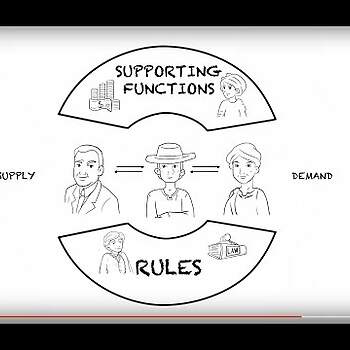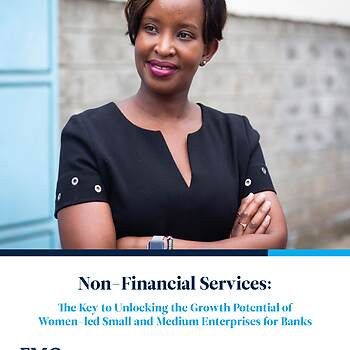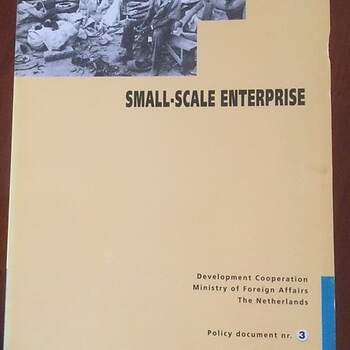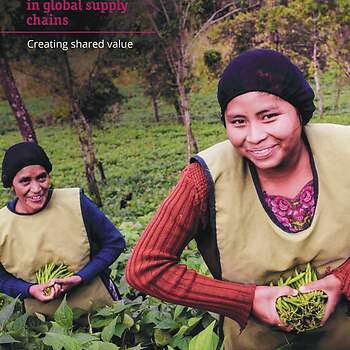Some figures on women-led SMEs
Female entrepreneurship (like self-employment in general) is an important vehicle for women’s empowerment in low-income countries. The majority of female entrepreneurs in lower income countries are informal micro-entrepreneurs, as discussed in the bullet 7. Additionally, there are substantial numbers of female small and medium entrepreneurs. Figures are only available for formal small and medium enterprises (SMEs). Globally, one third of formal SMEs are owned by women. In South Asia and Sub-Saharan Africa the numbers are somewhat lower, at 18% and 29% respectively (World Bank Group open data).
The International Finance Corporation (IFC, part of the World Bank Group) defines a small enterprise as having 10-49 employees and having total assets and/or annual sales between USD 100,000 and 3 million, and medium enterprises as having 50-300 employees and having total assets and/or annual sales between USD 3 and 15 million.
Dutch policy to support women-led SMEs starts around 2013
In the decades since the 1970s, Dutch support to women-led enterprises was mostly related to informal micro-enterprises rather than SMEs. This changed around 2012. In the 2013 policy note A World to Gain Minister Ploumen announced that women entrepreneurs would be an important target group of the support provided through the private sector. This also concerned the Facility for Sustainable Entrepreneurship and Food Security (FDOV) and the cooperation with Agriterra. Similar statements were made regarding the Dutch Good Growth Fund (see bullet 10): special attention should be paid to women entrepreneurs in view of their contribution to development on the one hand and their difficulties in getting access to capital on the other.
MFA’s DDE department translated this into a strategy of support to women-led SMEs. This took the form of mainstreaming gender in an existing strategy of supporting SMEs in lower income countries. DDE considered SMEs as key engines of growth and employment creation. The relatively small sector of SMEs in lower income countries, as compared to higher income countries, pointed to a ‘missing middle’. Creating a stable middle class of SMEs would provide prosperity and stability. Gender-inclusive support to SMEs became a crosscutting strategy in the sub-sectors of DDE’s policy, notably in financial sector reform, sustainable value chain development and support to market access.
WEE in financial sector reform and sustainable value chain development are described in separate bullets 10 and 12.
DDE’s support to market access was inspired by the ‘Making markets work for the poor’ (M4P) approach. M4P is now more commonly known as Market Systems Development. It seeks to change the way that markets work, so that poor people gain access to markets and benefits. Tackling market failures and changing business practices are important components. A donor forum, in which MFA was quite active, helped develop this approach (Donor Committee on Enterprise Development DCED). Attention in this forum for gender mainstreaming led to a web-based WEE Gateway. Digitalization is increasingly used in gender-inclusive Market Systems Development, as a tool to take away mobility, time and control constraints for women. An interesting example is this project on mobile marketing from small-scale women in Kenya.
An example of a market access project is Trade-Mark East-Africa (TMEA). It has since expanded to Trademark Africa. TMEA was a large multi-donor project for regional economic integration in East-Africa. It focused on infrastructure, logistics and regulatory reform. The program also worked with cross-border traders in the region, 80% of whom are women. MFA was one of the donors that lobbied for better gender mainstreaming. In the years 2010-2017, TMEA developed a gender policy. It partnered with the Eastern African Sub-regional Support Initiative for the Advancement of Women (EASSI), one of the grantees of FLOW1. In the next phase from 2017, TMEA mainstreamed gender as one of the key objectives. Its Women and Trade programme seeks to increase incomes and improve livelihoods for women traders and women-led enterprises.
A key question remained to what extent the instruments of development through the private sector reach informal SMEs. Are these instruments more accessible for SMEs with a minimum of formal status, such as a bank account? In the case of women-led SMEs, an additional question was how to encourage micro-entrepreneurs (the large majority of female entrepreneurs) to grow into small enterprises that would create jobs. How to find and support the ‘gazelles’, the female micro-entrepreneurs with the ambition and potential to grow beyond subsistence? These questions were part of the strategy discussions within DDE. They were also taken up by MFA’s Knowledge Platform on Inclusive Development. Tentative results suggested that the answers lie in strengthening the drivers of WEE (as identified in the WEE introduction, see bullet 2).
DDE also consulted with internationally operating Dutch companies to explore what these could do to enhance the economic empowerment of women in their value chains. Most companies did not have clear strategies for gender inclusion, though Accenture was actively promoting procurement from women suppliers with their clientele.
Apart from gender mainstreaming in DDE strategies, female SMEs were also supported through gender stand-alone projects. These were often in agricultural contexts. An example that was not limited to agriculture is the SNV project Enhancing Opportunities for Women’s Enterprises (EOWE, 2016-2020) funded under FLOW 2. It aimed to boost the start-up and development of women’s businesses in rural areas in Kenya and Vietnam. The approach combined enterprise development, social transformation and policy advocacy interventions. Engaging men through household dialogues, and enhancing women’s leadership in cooperatives and community organizations were important components.
Other Netherlands-based NGOs were also active in the domain of women’s entrepreneurship, partly with MFA funding. An example is ICCO, that helped establish Capital 4 Development Partners B.V. (C4D Partners), an impact fund manager. As of June 2022, C4D Partners had invested more than 40% of their assets under management in women owned or led SMEs.




